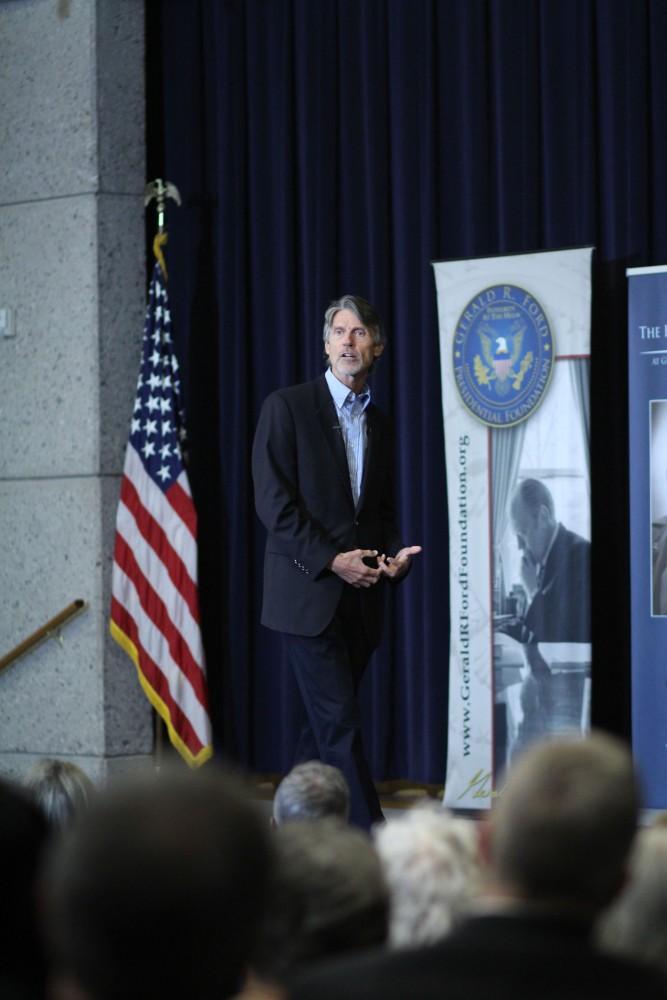H.W. Brands speaks at Hauenstein Center event

GVL / Sheila Babbitt H. W. Brands lectures on “The Golden Age of the Senate” at the Gerald R. Ford Museum on February 22nd, 2018.
Feb 26, 2018
“We live in a time where political institutions evolved in a way that speeches given in the Senate or House of Representatives do not create decisions based off what was said,” said author and professor H.W. Brands. “Henry Clay, Daniel Webster and John Calhoun lived in a time where political speech mattered.”
Brands spoke to a packed room at the Gerald R. Ford Presidential Library and Museum on Thursday, Feb. 22, for an event hosted by Grand Valley State University’s Hauenstein Center for Presidential Studies. He took the stage at 7 p.m. to discuss three politicians of the past who were driving forces in the U.S.
“Why is it all of the presidents of the 19th century are forgotten?” Brands asked the crowd. “There’s a reason the American Constitution is not written with the presidency at the center.”
Presidents are very convenient characters to hang your hat on, Brands said. The thrust and parry of what went on at Pennsylvania Avenue didn’t revolve around one person; Brands instead chose to look at three men who impacted the country the most in the early 1800s.
U.S. Sens. Clay, Webster and Calhoun are known as the Great Triumvirate. However, this wasn’t exactly a good nickname for the trio. They were all powerful, persuasive speakers, Brands said, but the three were continuously arguing against each other. Clay would change people’s minds while debating Calhoun and Webster would rebuke both, Brands explained.
Brands took the crowd from the War of 1812 to the Compromise of 1850. He described a deep and rich history of the early 1800s and many issues that the Great Triumvirate argued opposing sides for. Clay, Webster and Calhoun all came from different parts of the U.S. Therefore, they each held their own ideologies about the problems of the country at the time and were tremendous at expressing their opinions, Brands said.
People often think the problems that were solved in the past do not matter, Brands said, adding that we don’t have a time machine to the future, but do we have one to the past. We are able to see how different issues were taken care of in the past and, as a result, how we can approach problems today. For example, according to Brands, some arguments the trio would make for taxes in the 1800s are still arguments used today.
Brands said that when he writes, he tries to forget about the future. This is because the only way to understand history is to abandon hindsight. We know how events have turned out in the past, but the people of that time had no idea what lay ahead, Brands said.
Brands finished an hour-long speech followed by a 20-minute Q&A segment. Afterward, he thanked a boisterous crowd one more time.
“H.W. stand for ‘history whizz kid,’” said Gleaves Whitney, director of the Hauenstein Center. “I’ve lost count of how many times I’ve had the pleasure of having Brands speak for us.”
“The Hauenstein Center invites diverse, intellectually challenging speaks,” said Elaine Didier, director of the Gerald R. Ford Presidential Library and Museum. “It is a delight to have Brands here tonight.”
Afterwards, the MAK award was posthumously given to Ralph Hauenstein. The Michigan Historical Commission gave the honor for the historical preservation that Hauenstein had provided throughout the years.

























